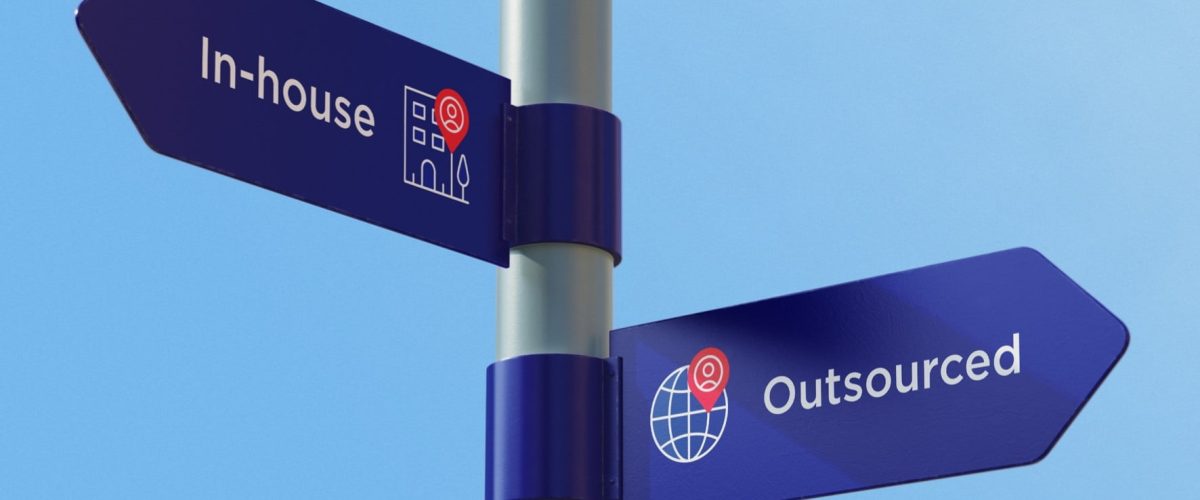Need more help for your business? If you’ve reached that crucial crossroads, then you’re probably torn between one of two choices: outsourcing the additional work, or hire someone full-time for the position. Both have pros, both have cons…it’s just a question of what is in the best interests of your business.
In-House – Pros and Cons
An in-house IT team consisting of company employees can have many benefits. First and foremost, being in charge of personnel hiring and HR processes means you’ll be able to handpick your team – you might prefer to hire a specialist in a specific field, for example. You’ll also be able to develop talent specifically curated for your business. Needless to say, this has plentiful long-term rewards. It may also be much easier to course-correct during projects, or finetune any issues you identify during IT work.
Furthermore, having your IT department based within your business itself usually means queries and technical issues can be dealt with very quickly. Depending on the size of the company, it may even be an option to hire a night-shift team to ensure 24-hour cover across IT.
With an in-house team, the executive team can control project management and work processes extremely efficiently. Additionally, since the IT department is based within your business, an innate understanding of the tasks, challenges, processes, systems and methodologies specific to your company will be extremely familiar to the team. This not only saves time in terms of briefing and training, but can lead to a more in-depth understanding of potential issues and more specific future-proofing.
Outsourcing – Pros and Cons
Many businesses choose to delegate IT projects out to an external agency or MSP, which can have a number of pros.
Depending on the type of work the business requires overall, outsourcing to a specialist agency can be more cost-effective – rather than having to hire experts yourself, you can pay an agency rate to benefit from their experts’ knowledge and skills for a flat rate. Paying a per-hour or per-project rate can be economical than paying long-term salaries, depending on the type and frequency of work you require.
Outsourcing to an MSP can also mean access to a wider variety of expert skills from across a broader spectrum of specialities. This can be particularly beneficial for businesses with a specific project or task to work on; for example, businesses with an upcoming office move, new app launch or system transition may choose to employ the expertise of an MSP.
With all IT work and associated details (like holidays, sickness, absence and pay) dealt with by the MSP, often outsourcing can mean you save a lot of time and work on HR for your IT staff. By imposing a Service Level Agreement you’ll also guarantee defined standards of work which are easily enforced.
For larger businesses who may also have on-staff IT personnel, outsourcing for ongoing maintenance or a specific project can mean your in-house team can focus on long-term strategy, governance and architecture planning, without the distractions of additional tasks.
Is Outsourcing best for my business?
Ultimately, the decision on whether to keep all your IT resources in-house, outsource everything, or to utilise a combination of both methods will come down to the size, sector, projects and goals of your business.
Start-ups and very small companies often find outsourcing to be the most beneficial option. It reduces the need for office space, cuts down on costs in terms of both equipment and salary payments and also means the company benefits from all the expertise of an experienced team without having to add to personnel or in-house resources. Management of any issues and risks will be handled by the MSP on the business’ behalf.
Corporations and larger businesses will often have the manpower and resources to be able to fund and maintain an in-house IT team, without compromising on skill-level or cost efficiency. This can mean quicker response times, which for larger businesses are often crucial for productivity, as well as increased familiarity with systems, teams and software. Companies handling lots of sensitive data or with large-scale privacy concerns may also prefer to keep all IT staff in-house to mitigate any risks in terms of confidentiality and data-handling; an on-staff team also means the company has full control over personnel hiring and HR issues.
Larger businesses in certain sectors, such as manufacturing have a heavier reliance on software solutions such as Enterprise Resource Planning (ERP) software which often require heavy integration with the rest of the businesses software. This often means that an internal team is necessary, frequently backed up by external expertise.
Many larger businesses opt for a hybrid model, whereby an in-house team is responsible for strategy and development while an outsourced team works on a retainer for maintenance and troubleshooting. Equally, larger companies often choose to work with an MSP for specific technical or specialist projects, such as migrating networks or launching applications or new software.
For most businesses a hybrid solution offers the best Return on Investment (ROI) due to a mixture of internal resource backed by external experts in specific fields.
Speak to our team about outsourcing
Leadership Services has many highly experienced IT directors that can help if you decide outsourcing is the right decision for your business.
We’re always happy to have a no-strings, free-of-charge conversation about how one of our IT leaders can help give your company a competitive advantage with a robust, technology-driven strategy that aligns with your business-specific business goals. If you’d like to discuss how we can help, please get in touch or you can read more about our services here.
